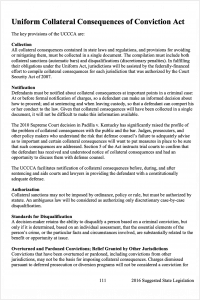Uniform Collateral Consequences of Conviction Act (UCCCA)
The Council of State Governments and the Uniform Law Commission
(January 2016)
Prepared as part of The Council of State Governments' Shared State Legislation–or SSL–program in support of the efforts of the Uniform Law Commission, the The Uniform Collateral Consequences of Conviction Act (UCCCA) is an effort to improve public and individual understanding of the nature of the problems associated with collateral consequences and, in appropriate circumstances, to provide partial relief from these disabilities to people who suffer from them.
Key provisions of the UCCCA include that:
- All collateral consequences contained in state laws and regulations, and provisions for avoiding or mitigating them, must be collected in a single document and that the compilation must include both collateral sanctions and disqualifications.
- Defendants must be notified about collateral consequences at important points in a criminal case–at or before formal notification of charges, at sentencing, and when leaving custody.
- Collateral sanctions may not be imposed by ordinance, policy or rule, but must be authorized by statute, with an ambiguous law considered as authorizing only discretionary case-by-case disqualification.
- A decision-maker retains the ability to disqualify a person based on a criminal conviction, but only if it is determined, based on an individual assessment, that the essential elements of the person’s crime, or the particular facts and circumstances involved, are substantially related to the benefit or opportunity at issue.
- Convictions that have been overturned or pardoned, including convictions from other jurisdictions, may not be the basis for imposing collateral consequences. Further, charges dismissed pursuant to deferred prosecution or diversion programs will not be considered a conviction for purposes of imposing collateral consequences.
- An Order of Limited Relief that permits a court or agency to lift the automatic bar of a collateral sanction, leaving a licensing agency or public housing authority free to consider whether to disqualify a particular individual on the merits.
- A Certificate of Restoration of Rights that offers potential public and private employers landlords, and licensing agencies concrete and objective information about an individual under consideration for an opportunity or benefit, and a degree of assurance about that individual’s progress toward rehabilitation, and will thereby facilitate the reintegration of individuals whose behavior demonstrates that they are making efforts to conform their conduct to the law.
Resource Type
Standards, Policies, and Model Legislation
